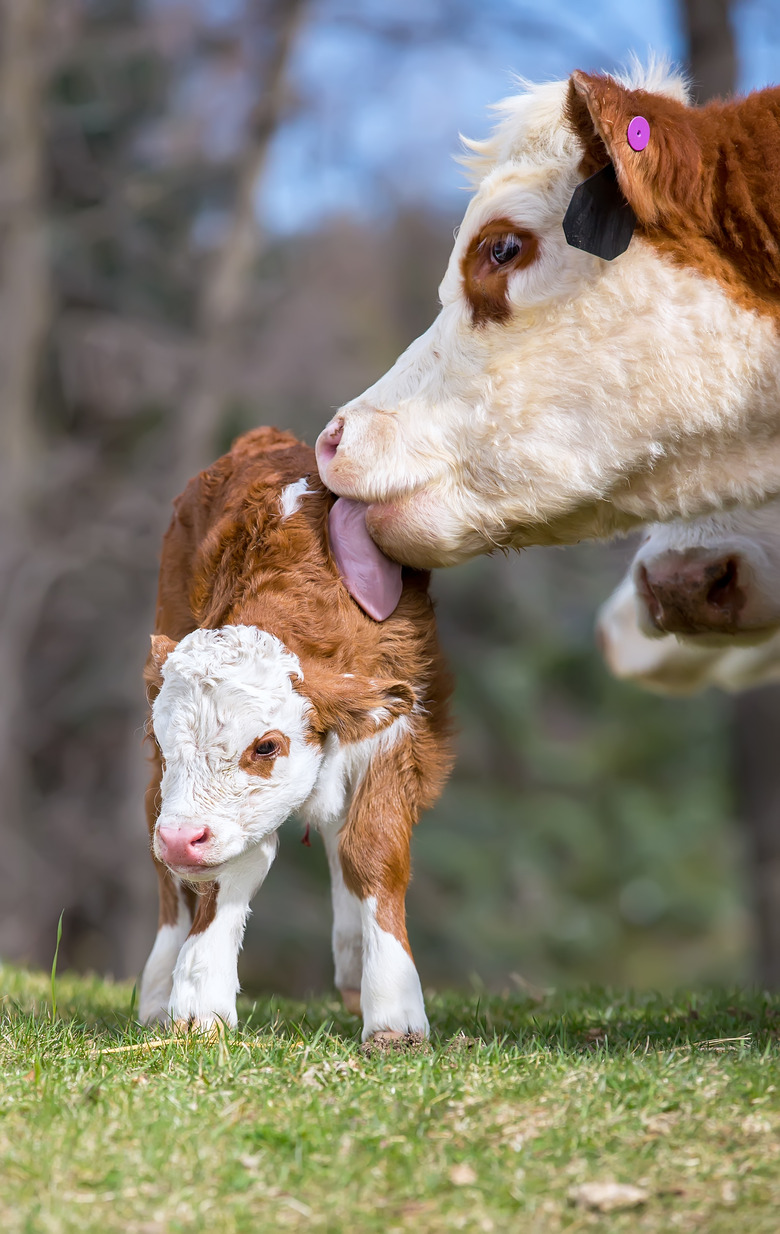Why Do Animals Lick Their Newborns?
Humans are one of the few mammals who don't instinctively lick their newborns. From dogs and cats to deer and cattle, the majority of mammal species lick their offspring after birth. But why do cows lick their calves? How about dogs or cats? Most mammals lick their young for the same or similar reasons.
Why Do Animals Lick Their Newborns?
Why Do Animals Lick Their Newborns?
Animals, primarily mammals, lick their young for a number of different reasons. Licking often factors heavily into the bonding process between mothers and offspring. It also poses a crucial element in removing the afterbirth from the young for cleaning purposes and to prevent the baby from becoming chilled. For many mammals, licking also provides important stimulation to defecate or urinate.
Interestingly enough, licking their young can also help mammals protect their offspring from predators as well. Human mothers don't need to do any of this for a number of reasons, including the fact that humans have evolved to clean with their hands and not their tongues.
Why Animals Lick Their Newborns: Cleaning
Why Animals Lick Their Newborns: Cleaning
Perhaps the primary reason animals lick their young is for the general purpose of cleaning. Young mammals often have remains of the placenta, also known as afterbirth, still attached to them. In some cases, the afterbirth can even be blocking the young's mouth or nose and preventing them from breathing properly. Licking allows the mother to remove this afterbirth. During the cleaning process, the mother also eats the remains of the afterbirth, helping her regain important nutrients and energy lost during the labor process.
Mammals are warm-blooded, which means they can maintain and regulate their body temperature internally regardless of the elements around them. However, their young cannot regulate their body temperature yet, and becoming chilled can potentially result in hypothermia or death. The afterbirth can quickly cause the newborn to become chilled, as it draws heat away from the body when it cools. By licking the young, the mother removes the afterbirth and helps keep her offspring warm.
Animals Bond With Their Newborns Through Licking
Animals Bond With Their Newborns Through Licking
Licking also provides crucial bonding between the mother and the newborn, as seen with a mother cow and her calf. The scent of the afterbirth and the process of licking the calf strongly impact a cow's maternal instinct by releasing hormones, and it prevents her from rejecting her calf.
In addition to the bonding that occurs for the mother, licking also encourages the newborn to bond as well. The mother's licking helps draw the newborn's attention to her, often stimulating the newborn to begin nursing. Once the young begin nursing, they quickly regain energy lost during the birthing process. For some animals, such as wildebeest and other prey species, standing and running quickly after birth can mean the difference between survival – and becoming dinner.
How Licking Protects Newborns From Predators
How Licking Protects Newborns From Predators
However, stimulation to stand and begin nursing isn't the only way licking helps protect newborns from predators. Mothers licking their newborns remove the afterbirth and clean their young, thus removing the telltale scent of labor. This helps keep predators from smelling and targeting the newborn.
Deer take this process a step further. Through thorough grooming, mother deer can remove nearly all scent from their young. Fawns do not have highly developed scent glands and have little scent of their own. When the mother visits the fawn to nurse, she licks away any smells that might attract predators before leaving the fawn to hide in a new location.
Newborn Mammals and Bathroom Stimulation
Newborn Mammals and Bathroom Stimulation
One final element in why animals lick their newborns involves basic bodily functions. For many mammals species, young cannot urinate or defecate on their own. The mother must lick them to stimulate them to go to the bathroom. The mother will also often consume the waste as well. This is another important strategy for keeping predators from smelling her young.
References
- HowStuffWorks: Why Women Don't Lick Their Babies Clean After Childbirth
- Wag!: Why Do Dogs Lick Their Puppies
- Canadian Cattlemen: Maternal Behaviour in Cows
- Northern Woodlands: Fawns Hide in Plain Sight
- Victoria Advocate: Canine Mom Licks Her Pups to Stimulate Development
- Merriam-Webster: Warm-Blooded
Cite This Article
MLA
Zinni, Yasmin. "Why Do Animals Lick Their Newborns?" sciencing.com, https://www.sciencing.com/animals-lick-newborns-10019468/. 30 September 2021.
APA
Zinni, Yasmin. (2021, September 30). Why Do Animals Lick Their Newborns?. sciencing.com. Retrieved from https://www.sciencing.com/animals-lick-newborns-10019468/
Chicago
Zinni, Yasmin. Why Do Animals Lick Their Newborns? last modified March 24, 2022. https://www.sciencing.com/animals-lick-newborns-10019468/
